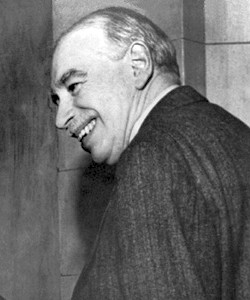 Image via Wikipedia
Image via Wikipedia Economic New School, n.d. Web. 21 Feb. 2010.
 Image via Wikipedia
Image via Wikipedia [Abstract: Adam Smith, the economy philosopher. When he was born, where he was born, and his education background. The economic ideologies he is famous for, what book or books did he write and what is the topic and substance of the book or books.]
Adam Smith
Adam Smith was one of the first political economists. He was a very curious individual, he enjoyed reading and learning. Smith became known as a great lecturer2 although he was personally very quite. His book “Wealth of Nation,” published in 1776, has remains the most influential book on economics ever written. He was heavily influence by Aristotle.
Adam Smith was born on June 5, 17231 in Kirkaldy, Scotland. His father had been a comptroller of customs and had died before he was born.2 He live with him mother for the majority of his life, she live to be ninety. His education began at the University of Oxford at the age of fourteen, he was sent of on a scholarship. It is there where he learned Latin and was formerly introduced to the Greek education, which influence could be appreciated in his way of thinking. It is there where he read up on Hume’s A Treatise of Human Nature (1734-5). Smith’s interest in the work of Hume brought him into conflict with Oxford University. In 1750 Smith met Hume who later became a close friend.1 When he returned he became part of the literati, "the brilliant circle in Edinburgh which included David Hume, John Home, Hugh Blair, Lord Hailes and Principal Robertson."2
He became the professor at Glasgow University in 1751 as professor of logic. He then transferred to the chair of moral philosophy in 1752. He had many unexpressed ideas which he would deliver seldom, yet with great oratory. His lecturers were about the “field of ethics, rhetoric, jurisprudence and political economy.”3 His students loved him and people came from afar to take him in. His lectures on moral philosophy were the subject to his first book The Theory of Moral Sentiment published in 1759. In his writing he talked about the standards of ethics that hold society together and the emphasis harmony of human motives under “beneficent providence.” He wrote about the origins of our feelings about moral approval and disapproval, ethics. Part of the explanation he mentions in his book is our ability to put ourselves in the shoes of others, sympathy. He also writes about the ability we have to judge ourselves as others would judge us. The book was become very popular; it was a success France and Germany.2 Smith continued to revise it until his death in 1790.
Smith moved to London in 1776.2 That same year Smith published an Inquiry into the Nature and Causes of the Wealth of Nations, “which examined in detail the consequences of economic freedom.”3 It covered many concepts pertinent to economics that dealt with economy like division of labor, origin and use of money, stock, and commercial systems.4 His work was part of his philosophy studies, in those times much of the study carried out by universities was in history and philosophy. A course in jurisprudence, under philosophy, would in turn have the study of various leg at studies which in turn leads to the study of government and finally to the study of political economy. He had discussed form his work with the literati of the day, it was there where he met the illustrious Benjamin Franklin and Samuel Johnson. He traveled to France in to meet some of the “physocrats” including Voltaire. It was there he started writing the Wealth of Nations.
It affected the middle class of Europe and freshly independent United States of America.5 Europe was still heavily influence by the institution of feudalism, a medieval social system, in which vassals held land from lord in exchange for military services. The feudal system placed limitations and restrictions on the rising industrial bourgeois. US revolutionaries had just broken chain from that obnoxious system. Wealth of nations provided the “theoretical cannon hot for the chorus of growing bourgeois” that sparked their own strike against the Feudalistic bureaucracy and society. Smith critiqued the feudalist society ability to further develop Europe’s economy, it
would strangle industrial growth. He plead that the only correct way to practice economics was through the dictates of capitalism and not the “defunct feudalism.”5
Wealth of nations had the impact of establishing economics as an autonomous subject. It launched and laid the foundation for the doctrine of free enterprise that still holds today. He is commonly recognized as for the expression of the “invisible hand.” He uses the “invisible hand” to demonstrate how self interest guides the most efficient use of a nation’s resources, with public welfare coming as a by product. “He argued that state and personal efforts to promote social good are ineffectual compared to market forces.”3
After his return from France he stayed din his hometown of Kirkcaldy with his mother, he lived on the annuity of Duck of Buccleugh . He occupied himself in study only. Smith died in Edinburgh on July 17, 1790, at the age of 67, from an illness; “he was buried Canongate churchyard.”2 After his death it was discovered that he had devoted a “considerable part of his income to numerous secret acts of charity.”3
1. DeLong, Brad. “Adam Smith.” Ecomomist. U of California at Berkley, 13 July 1997. Web. 27 Jan. 2010.
2. Landry, Peter. “Adam Smith.” Blupete. N.p., 2005. Web. 27 Jan. 2010.
3. Chew, Robin. "Adam Smith." Lucidcafe. N.p., 2010. Web. 31 Jan. 2010.
4. Canaan, Edwin, ed. "An Inquiry into the Nature and Causes of the Wealth of
Nations." Library of Economics and Liberty. Liberty Fund, Inc., 2000. Web.
31 Jan. 2010.
5. Baggins, Brian. "The Wealth of Nations." Adam Smith Reference Archive. Marxist
Internet Archive, 2000. Web. 31 Jan. 2010.